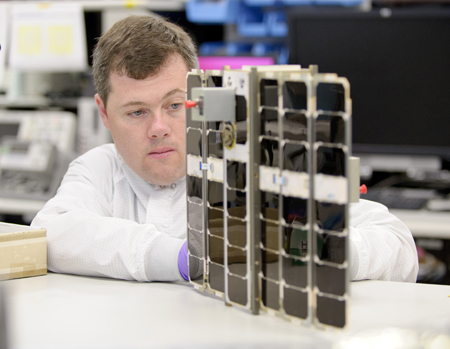Boeing Delivers 2 Nanosatellites to US Air Force

Nano Sat in lab with Darin E Anderson
Boeing [NYSE: BA] has delivered two Space Environmental NanoSat Experiment (SENSE) satellites to the U.S. Air Force that will help assess the value of small satellites in military space operations.
Weighing less than 9 pounds (4 kilograms) each and measuring 30 x 10 x 10 centimeters in size, the nanosats are scheduled to launch on the ORS-3 mission in the summer of 2013 and shortly after will begin collecting and transmitting weather data. Each nanosat contains a sensor and GPS receiver to gather data to support weather prediction and assessments. A miniature S-band transceiver downlinks spacecraft and mission data at one megabit per second.
“We anticipate these nanosatellites will play a significant role as affordable and resilient assets in future Air Force space architectures,” said Col. Scott Beidleman, director, Development Planning Directorate, Air Force Space and Missile Systems Center. “We look forward to the important data they will collect and provide to the warfighter.”
“The SENSE nanosats offer customers an affordable, operationally robust option to conduct military missions using spacecraft no larger than a standard loaf of bread,” said Bruce Chesley, Boeing director of Advanced Space & Intelligence Systems, a division of Boeing Phantom Works.
Boeing worked with the Office of Naval Research, SRI International, The Aerospace Corp., and Atmospheric & Space Technology Research Associates to build, test and integrate the nanosats. The satellites are powered by highly efficient ultra triple-junction solar cells produced by Boeing subsidiary Spectrolab.
